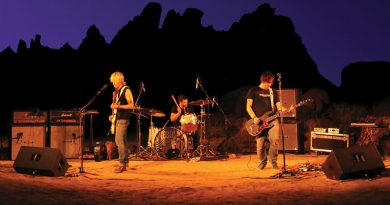Review: Malvost ‘Oljud’
The Book Of Lamentations sees the destruction of Jerusalem as an act of Gods hand, due to the sins of human beings. The Sumerians thought likewise 1000 years earlier, and although their sentiments were not focused on Jerusalem, God was tasked with the act of demolishing the ‘house’ as pay back for human sin. Even Edgar Allen Poes The Fall Of The House Of Usher, could be thrown onto the timeline.

Malvost’s album Oljud, presents us with a set of lamentations, continuing the universally metaphoric tale of caution. Malvost has stated the album addresses such themes as depression, isolation, memory and environmental crisis. It feels as though the tracks are the unfurling of a sequence of states of mind and emotion, which often interconnect, and are inextricably connected to our social and physical environment. The album also turns Jeremiah’s lamentation around, the house, or city, which is destroyed is our own psyche, and it’s by our own hands, not Gods. The impression is equal parts reflective and foreboding.
The album recasts the dense walls of noise music which can often feel impenetrable, with a sensitivity often associated with ambient composition, to deliver us something accessible and emotionally transparent. There is a sense of vulnerability, such as that conjured up in track one Lamentations At The Menhir. The pain of isolation, depression and grief are not buried beneath angst or harsh soundscapes, the track is inviting us to share the space, to share our collective feelings of desolation and depression. Emotions are delivered through the slow progression of a melancholic riff which soothes and caress’s the organs, while the mind makes its way through a sandstorm of static.
To lament before a Menhir, the mysterious vertical stone of symbolic power, could be to share grief with that which has already transcended, parts of ourselves, the collective human soul.
it actually places the listener in an obscure Donnie Darko-esque suburban dystopia…
Kiasma carries a sense of confession, and the spoken word is cathartic to listen to. It sounds as though its close and personal, however it could be conveying a much broader narrative, again the universal connection which all personal grief has manifested from. There is definitely light cutting through the bleakness. The sound composition which sits beneath the spoken word, is chaotic metallic noise, although where it sits in the mix subdues it. The track has a bed of nails effect, the components, which at first appear sharp, aggressive, and heavy in sentiment, all work to suspend the listener in an air of meditative introspection.
The third track Viktorija is like listening to an obituary from the community paper being read over the local church organ on a Sunday mornings mass. This is not to undermine the track mind you; it actually places the listener in an obscure Donnie Darko-esque suburban dystopia. There is a sense that fragility and temporality are getting the better of memory, and the droning organ seems to be recreating personal and public histories for a town large or small, creating a new palette for the flower bed, which was never there, and a pebble driveway which was either uphill or down.
The Desecration Of Beavivi, or the god of sun, could definitely be a nod towards the desecration of the earth, climate change. And it could be that the murderess intentions we have towards our fellow earth species is a trigger for some serious mental illness. The organ continues on this track, although the organ player has dropped dead, their head crashing down onto the keys, holding a note, oddly their feet are still frantically pedalling away; perhaps my own metaphor for global warming!
The track opens with chanting possibly alluding to the ancient connections which are dying, a lamentation to the earth from a people connected with it. There is a bleakness setting in, the organ drones away under the weight of the motionless head, the vocals and spoken word have become sinister in their dual delivery, it feels as though we are finishing up somewhere between the industrial age and the technological age, blind folded in the trunk of a diesel truck.
Label: Trepanation Recordings
Band Links: Facebook | Bandcamp | Instagram
Scribed by: Spencer Reid


